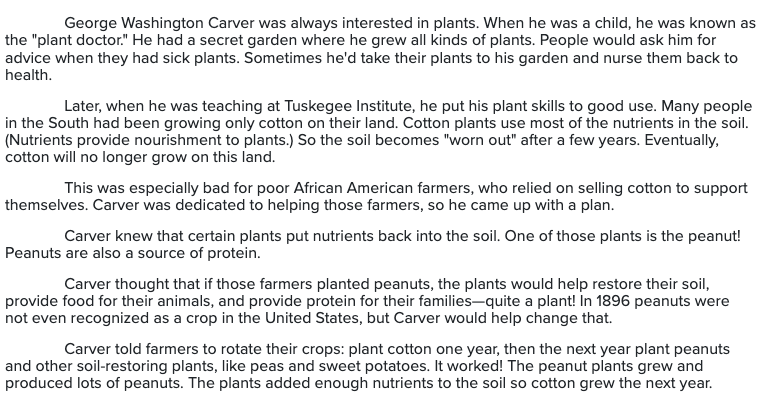
Explanation:
The first paragraph gives the information to correctly answer this question.
Explanation:
This passage is arranged by problem and solution. The author states a problem that the cotton farmers were having: "Eventually, cotton will no longer grow on this land." The author then presents a solution:
"Carver told farmers to rotate their crops: plant cotton one year, then the next year plant peanuts and other soil-restoring plants, like peas and sweet potatoes. It worked! The peanut plants grew and produced lots of peanuts.”
Explanation:
The second paragraph discusses the problem the cotton farmers were facing. The cotton crops had depleted the nutrients from the soil.
Explanation:
The last paragraph answers this question. "Carver told farmers to rotate their crops: plant cotton one year, then the next year plant peanuts and other soil-restoring plants, like peas and sweet potatoes. It worked! The peanut plants grew and produced lots of peanuts."
Explanation:
Answer choice B best summarizes what this passage is mainly about. Choices A and C are not even discussed in this passage. Paragraph 5 does discuss choice D, but it is not the main focus of the passage.
Explanation:
Answer choice A best defines "crop rotation," as the passage gives the definition in the last paragraph.
Explanation:
This choice is correct because both verbs agree. Choice A is not correct because "have" does not agree with the first verb, "having." Although the correct verbs are used in choice B, it still is incorrect because the singular article "a" should not be used with the plural noun "detectors." Choice D incorrectly uses a semicolon, although the verb choices are correct.
Advertisement
Explanation:
This choice is correct because it uses commas to set off a phrase. Choice A omits the comma after "rotate." Choice C uses a comma after "Remember" where it is not needed. Choice D uses no commas at all, which is not correct.
Explanation:
This choice uses the correct flow of ideas. Choice A incorrectly separates the idea of storing from "per person per day." Choice B is awkward and almost incomprehensible. Choice D incorrectly uses a comma after "day."
Explanation:
No capitals are necessary for the words "warm," "weather" or "climate" because they are not proper nouns or geographical names. Choices A and C are not correct because they capitalize words that do not need to be capitalized. Choice B is not correct because it does not have a comma after the opening phrase.
Explanation:
Choice D is the best sentence to follow sentence 12 because it would be a good sentence to logically follow sentence 12 since both mention best practices for batteries. Although the objects in choice A could be good items to include in an emergency supply kit, choice A is not a complete sentence. Choice B may be a good reason to have an emergency supply kit, but it is not on-topic with the content of sentences 11 and 12, which focus on supplies that should be in your emergency supply kit. Choice C is incorrect for similar reasons. Preparing for cold weather would be important if you live in a cold climate, but this sentence would fit better after sentence 7 and it does not fit better after sentence 12 than choice D does.